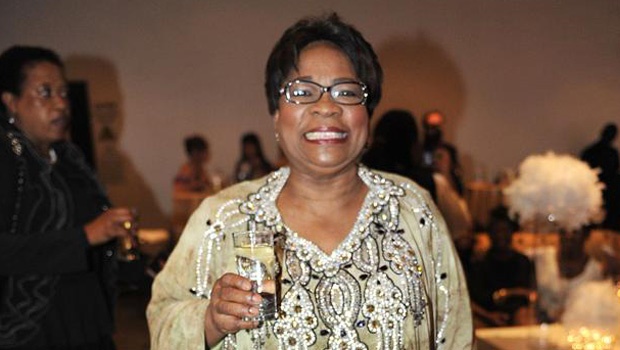
One in every three South Africans will suffer from a mental health problem at some point, but mental illness is still not spoken about or resourced enough. Artists, however, have increasingly been speaking out to highlight that mental illness is as important as any other illness. One such artist is beloved actress Lillian Dube. Gugulethu Mhlungu called her up and looked at the big picture
"Hello, Gugu my baby! We can’t talk for long! I have ADD [attention deficit disorder], so I can’t be still for long,” Lillian Dube says in that distinctive voice of hers when I call her this week.
I tell her I have ADHD (attention deficit hyperactivity disorder), so we’ll be quick.
At a recent media summit, organised by her chosen charity, the SA Depression and Anxiety Group (Sadag), the famous actress said that having cancer was better than having depression because cancer sufferers have support and people understand what they are going through.
“You can say to someone ‘I am in physical pain’ and, without even needing to see the wound or scar, they will understand. But with this [depression], you can’t even tell you have it sometimes, and it just feels like a bottomless pit and you are there alone,” Dube says.
Cassey Chambers, Sadag operations director, says: “Many people think that mental illness is something that happens to other people. But one in three people in South Africa will have one or more mental illness in their lifetime, so its happening to many ‘ordinary’ people. The stats mean that each household has at least one person suffering from mental illness.”
Mental illness is the umbrella term to refer to different mental conditions, and Chambers says the most common in South Africa are depression, bipolar disorder, schizophrenia, post-traumatic stress disorder (PTSD) and anxiety.
“These can be comorbid, meaning one person can have more than one at the same time,” Chambers says.
In its April 2016 fact sheet, the World Health Organisation (WHO) estimates that 350 million people of all ages suffer from depression globally, and says that more women are affected by depression than men and that depression can lead to suicide.
Trauma, gender and mental illness
Chambers says PTSD is common given the violent nature of South African life. Recently, Metro FM presenter and DJ Moeti “Mo Flava” Tsiki shared an all too familiar experience of suffering from depression as a result of being robbed. Hijackings, smash-and-grab incidents, house robberies and muggings can all cause PTSD, and/or anxiety and depression. More concerning is the impact of intimate partner violence on women’s mental health.
South Africa’s intimate partner violence statistics are terrifyingly high, and a recent policy brief compiled by Dr Kate Joyner from Stellenbosch University, the University of Cape Town’s Dr Kate Rees and Dr Simone Honikman for the Alan J Fisher Centre for Public Mental Health highlighted that “a woman died every eight hours in South Africa, and, of those murdered, 50% were killed by their intimate partners. The physical, mental and social consequences remain hidden. Cultural and societal norms are highly influential in shaping behaviour in intimate relationships; they can protect against violence or support and encourage it.”
The report also noted that intimate partner violence occurs in a social context that involves a vicious cycle with HIV, mental illness, poor reproductive health, poor childhood development and chronic disease, which women experience acutely. It is the endless and pervasive violence against women that makes them more vulnerable to depression, which both Sadag and the WHO have noted.
The 2014/2015 Victims of Crime Survey, released recently by Stats SA, offers little consolation, and shows an increase in violence against women. It says 57% of women are assaulted in their homes, 48.3% by someone known to them; 40% of sexual assaults occur in the home; and 31% of are committed by spouses or lovers.
Secondary trauma caused by ineffective or poorly resourced reporting and policing systems often compounds existing depression, anxiety and trauma suffered by survivors of sexual violence.
These issues have been at the core of the anti-rape protests at the universities of Rhodes and Cape Town. Stress and anxiety among black women has also been linked to an increase in adrenal exhaustion, hypertension and other lifestyle illnesses. A further contributor to mental illness is stress and anxiety about money, particularly among poor South Africans.
Young, gifted and suicidal
“There are 23 completed suicides every day in South Africa, and a further 460 attempted suicides,” says Chambers.
The people who are most at risk of this are those between the ages of 13 and 17, the so-called born free generation. And suicide is still largely underreported.
Often, depression and other metal illness in younger people is dismissed. But young people bear the brunt of all the various types of violence and challenges in the country, such as unemployment, which causes great stress.
Chambers says one of the challenges for suicidal young people is that they generally only seek help after a suicide attempt.
“We often see young people come to us for help between the ages of 18 and 23, but we also see people only come for help at the age of 50 and older after having lived with bipolar or a mental illness for decades.”
Sadag receives about 400 calls a day.
“Often, people are just glad to have someone to speak to, and someone to listen to them and describe what they are going through. You can see that people feel better just from being given information and resources,” Chambers says.
Isolation and stigma
“There is no way to say you are depressed. You think ‘hayi man, I am just a bit off’, but you aren’t,” says Dube, who has been living with depression since the days of apartheid.
“There’s no way you can tell people you’re depressed because you don’t know you’re depressed. But you can tell, there are always signs. If someone stops caring about themselves – they don’t bath, their hair is unkempt, they can hardly do their own buttons correctly, they stop wanting to do the things they used to enjoy ... those are big signs.”
Dube says that, in addition to the listlessness, the anxiety was particularly difficult for her.
“The anxiety was unlike anything I have ever experienced. Bengi’shayiwa yuvalo [I was hit by panic and fear], and what was even worse was that I would hear voices and think that someone was calling me or talking to me, and I think that’s also maybe why depression and other mental illnesses are associated with witchcraft because the idea is ugula ngekhanda [you are sick in the head], and that’s not ‘normal’.”
Chambers says that, although there is more information available and conversations around mental illness are being had, only 75% of those living with mental illness are receiving treatment.
“That means a quarter of people living with mental illness are not being treated or even being diagnosed...”
The reasons are often complicated: “Some people simply do not have access to mental healthcare or psychiatric facilities, and that includes something as basic as a hospital or GP. Some people simply don’t know where to go, while others are afraid that they will be classified as crazy and will be taken away, or they’ll be unable to provide for their children. There is still a lot of uncertainty and fear around mental illness. It is still not considered to be a real illness,” says Chambers.
Dube says of her own isolation: “I didn’t want daylight. I hated daylight, so I would close the curtains and cover myself with a blanket. I was dead inside...”
Her depression was worsened by a marriage that was heading for divorce. “Even though I was married to an alcoholic, I loved my husband and that made my depression even worse.”
She says she didn’t realise she could manage and deal with depression until one day she was in the third-class carriage on a train, listening to one of the preachers, “and I realised all I needed was my God...”
She says her depression has taught her that “there are many plastic people ... People who are there when you are in your spring or summer, but when the leaves fall and you are in autumn and winter, they are gone. This is why I like nature, I can stare at a tree for hours, and people think I am crazy. But nature has seasons and sometimes it is summer and everything is in bloom, and then it’s autumn and the leaves are falling. And I know that I have seasons,” says the actress who played the part of Sister Bettina, a nurse suffering from depression in Soul City.
“I actually think I have been fortunate by being depressed. It has taught me so much. It has taught me greater empathy. It has shown me that you can keep coming up again and again. It’s me and my God, and I am doing all the things I want to do. Depression has been a teacher for me – to love myself and other human beings, and every day is a blessing.”
Visit sadag.org for more information. If you need a referral to a psychologist, psychiatrist or support group, call Sadag on 011 234 4837 or 080 020 5026 and speak to a trained counsellor. Other useful contacts are: The department of social development substance abuse 24-hour helpline 080 012 1314 (free from a landline) or SMS 32312. Suicide Crisis Line 080 056 7567 (free from a landline) or SMS 31393
GLOBAL
+/- 800 000 people die due to suicide every year
Suicide is the 2nd biggest cause of death in 15 to 29-year-olds
60 million. The number of people affected by bipolar disorder. It typically consists of both manic and depressive episodes separated by periods of normal mood
About 21 million. The people affected by schizophrenia worldwide. Psychoses, including schizophrenia, are characterised by distortions in thinking, perception, emotions, language, sense of self and behaviour
SOUTH AFRICA
1 in 3. The number of people who do or will suffer from some kind of metal illness in their lifetime
Mental illness is the 3rd biggest contributor to the burden of disease
1% of our health budget is devoted to mental health
+/- 8 000 South Africans commit suicide each year
11% of all non-natural death are due to suicide
+/- 6 million South African suffer from post-traumatic stress disorder
75% of those suffering from mental illness are receiving help or treatment
15% of that 75% their taking prescribed medication
1 in 3. The number of patients who do not attend their doctor’s appointments. The most common reasons for this are:
• Forgetfulness 28.6%
• Lack of Support 24.2%
• Adverse reactions 13%
• Unavailability 11%
Compared with 14 other countries in the World Mental Health Survey, South Africa is:
2nd highest for substance abuse disorders
6th highest for anxiety disorders
7th highest for mood disorders
* Research by World Health Organisation and the South African Depression and Anxiety Group




 Publications
Publications
 Partners
Partners








